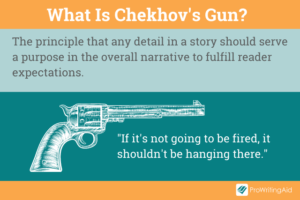I just watched an episode of Grantchester and I felt it engaged in a writing technique of which I disapprove. The writers of the episode essentially lied to the audience in order to further the suspense and narrative.
It’s a technique that I see rather a lot and I wanted to spend a little bit of my day trying to explain why I disapprove. As you may or may not know, I’ve written a few novels and some short stories. Now, my books and stories don’t sell many copies so take my writing advice with a grain of salt.
What do I mean by Betray Your Audience
There is a literary device called Chekhov’s Gun that is useful in the discussion of how not to betray your audience. At its heart, Chekhov’s Gun says don’t introduce elements into the story which are never used. If you introduce something that is never seen again, you’ve essential betrayed your audience.
The audience reads about an element, a gun perhaps, early in the novel and the expects the gun to be used later in some form. That being said, there are plenty of ways to betray your audience other than introducing an element that is never used.
It’s often the writer’s goal to conceal the ending from the audience. I don’t necessarily want you guessing the ending before it comes. There are a number of ways to camouflage the ending and keep the reader from figuring it out, but the worst way to do this is to mislead the audience with false information or omit key clues entirely.
What Happened in Grantchester
First off, let me say the show is better this season thanks largely to the fact the vicar is not an enormous turd, as were the two previous occupiers of the post.
Ok, so the episode in question involves Alphie returning to his childhood foster home at the behest of the man who raised him. The home is being closed by the local government and the children dispersed to adoptive parents. The children are afraid and upset and Potts, the father figure, invites Alphie to come and help with the transition.
All good so far. As Alphie arrives at the home he looks up to a high window where a woman in a nurse’s uniform looks down up on him with a menacing glare. Alphie looks puzzled and perhaps even a little frightened by this apparition.
We, the audience, are being told this nurse is someone to fear, that she might be the cause of some of the troubles that ensue.
The Betrayal
The episode is written in the style of a horror show rather than a detective genre but that’s fine. We learn at the very end of the episode, when the villain turns out to be one of the children, the nurse had nothing to do with it.
Again, it’s not that big a deal, just looking down from the window with a glare at Alphie’s does not rise to the level of betray the audience.
The problem is the nurse and Alphie grew up together at the foster home and know each other as close friends. They are clearly very fond of one another but we don’t learn this until the very end of the episode, after we’ve been fooled into thinking the nurse was potentially the culprit.
That is the betrayal. If Alphie saw his old, dear, childhood friend had returned to the foster home to work as a nurse, he’d be delighted! He’d rush up to see her, to ask her about her life since he left. A reunion scene ensues.
Of course, they didn’t want the audience to know this so they didn’t have this scene.
Rewrite
I’m going to engage in a little rewrite here to show how I might have done it. Have the reunion scene of Alphie and the nurse but add an undercurrent of malice to it. Alphie left her, went out into the world, and maybe she’s bitter about it. Maybe they had a fight when he left and she blamed him. Put some anger into the scene. That way we still think she might be the villain. Then, at the end, have them get over their anger and move on with their lives.
Conclusion
As I mentioned before, I’m not a best-selling author. The writers working on Grantchester are far more successful than me. Writing for a television serial is not easy work. My own writing is far from perfect. I do not mean to put myself on some sort of pedestal. I didn’t like how it was handled and I hoped my thoughts might be of use to other writers or would-be writers.
Feel free to disagree.
Tom Liberman
